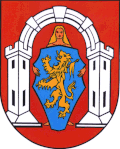 Interactive map of Danijel Rehak Sports Hall | |
| Location | Vukovar, Croatia |
|---|---|
| Coordinates | 45°22.39′N18°57.56′E / 45.37317°N 18.95933°E |
| Owner | City of Vukovar |
| Capacity | 3,000 |
| Surface | parquet |
| Construction | |
| Built | 1978 |
| Renovated | 2002 |
| Tenants | |
Danijel Rehak Sports Hall [1] is a multi-purpose sport hall in Vukovar with sporting, cultural, business and entertainment events. The capacity of the sports hall is 3000 seats, 2400 seating places and 600 standing places and it is mostly used for basketball matches as the home ground of KK Borovo Vukovar. Hall is built for XXIII Yugoslavia Open Championship Table Tennis 1978 hosted by Vukovar [2]
The hall Borovo operates more sports clubs in different sports : boxing, handball, basketball, volleyball, gymnastics . For the purposes of gymnasts 2015. onsite opened a hall for gymnastics. [2] Hall also has fitness centar and bowling alley.
